Was a Fort Worth man among the lawmen present when outlaw Sam Bass was shot at Round Rock and died on July 21, 1878?
In 1937 Dave E. Burns was eighty years old and living at 3808 Race Street when he dictated an oral history to an interviewer of the Federal Writers’ Project, which collected oral histories from thousands of Americans in the late 1930s. (Hometown by Handlebar contains several such accounts under the category “Verbatim.”)
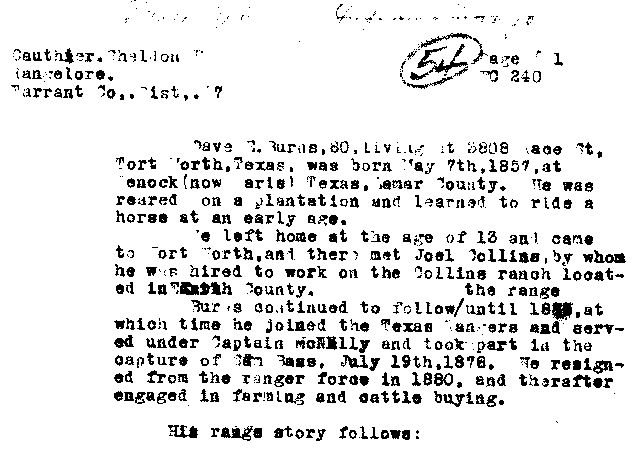
This is the interviewer’s abstract of Burns’s account. Burns said he left home at age thirteen and in 1870 came to Fort Worth, where he met Erath County rancher Joel Collins and later “took part in the capture of Sam Bass.”
Note that Burns says he was born at Paris in Lamar County in 1857.
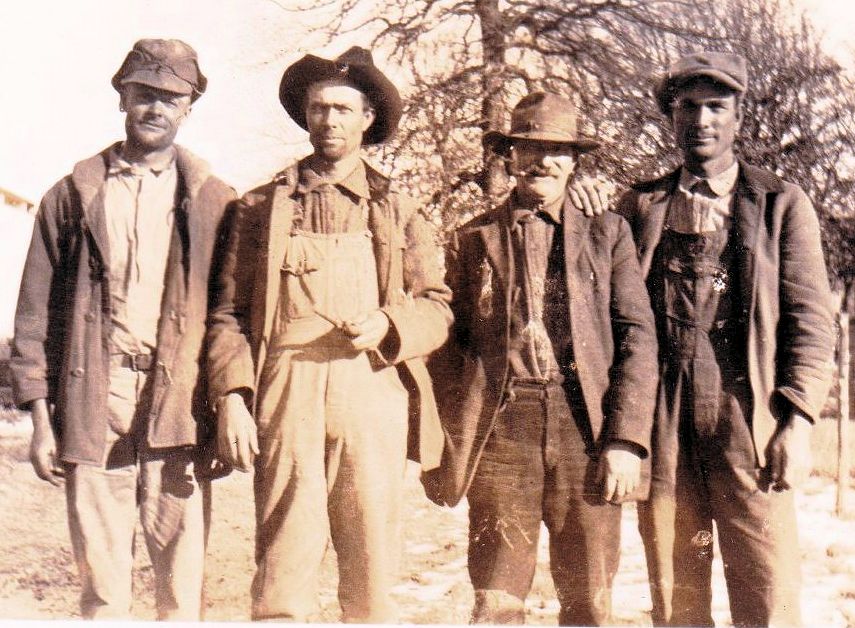
Dave E. Burns may have been the David Elbert Burns (third from the left) in this 1926 photo. David Elbert Burns, a family member told me, was born in Paris in Lamar County about 1860. (Photo courtesy of Karen Watts Edwards.)
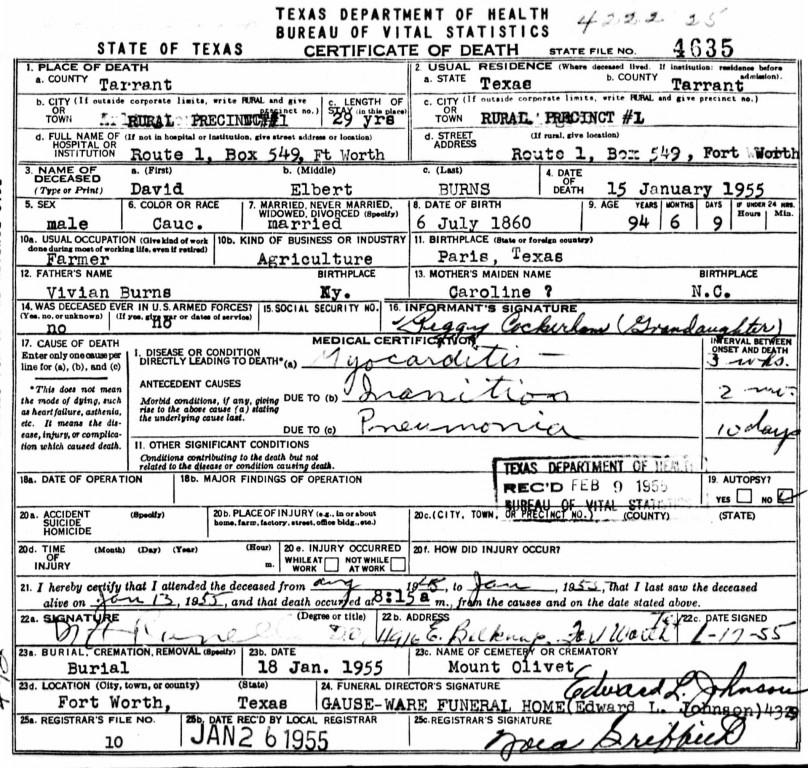
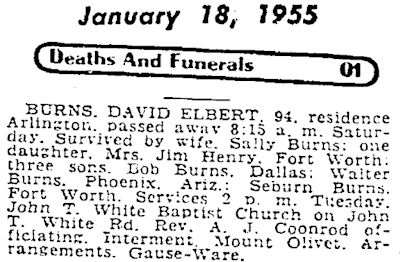
David Elbert Burns later lived in Fort Worth and died in Arlington.
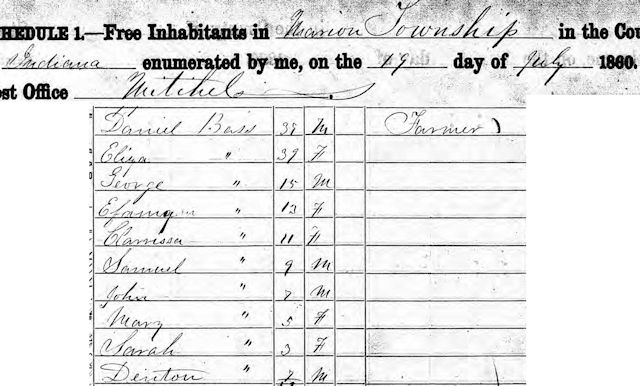 Before we get to Round Rock, some background: Samuel Bass was one of eight children born to Daniel and Eliza Bass. Sam was born in Indiana in 1851, was orphaned as a youth, lived with an uncle. Bass was in Denton County by 1870. He worked as a wood cutter, a stable and ranch hand, a freighter. In the early 1870s he graduated to racing horses. In 1876 he drove a herd of cattle from Texas up the Chisholm Trail. After squandering his earnings from the cattle drive, in 1877 Bass began robbing stage coaches in the Black Hills of South Dakota.
Before we get to Round Rock, some background: Samuel Bass was one of eight children born to Daniel and Eliza Bass. Sam was born in Indiana in 1851, was orphaned as a youth, lived with an uncle. Bass was in Denton County by 1870. He worked as a wood cutter, a stable and ranch hand, a freighter. In the early 1870s he graduated to racing horses. In 1876 he drove a herd of cattle from Texas up the Chisholm Trail. After squandering his earnings from the cattle drive, in 1877 Bass began robbing stage coaches in the Black Hills of South Dakota.
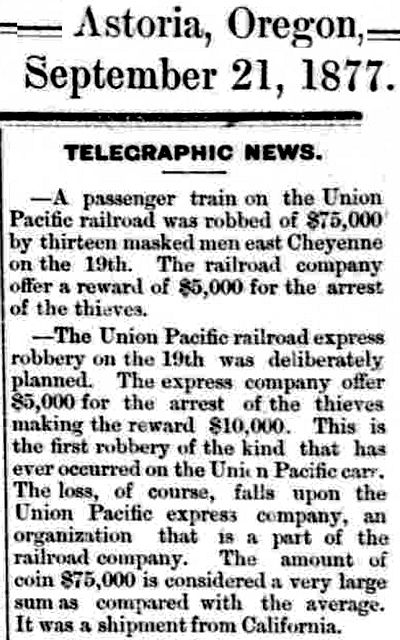
Finding only moderate success holding up stage coaches, Sam Bass hit the jackpot on his first train robbery when he and his gang on September 18, 1877 robbed a Union Pacific train near Big Springs, Nebraska. Early news reports had some of the numbers wrong, as shown by this clip from the Daily Astorian of Oregon: By most accounts, the gang numbered six and the money $60,000 ($1.2 million today).
 One of the members of the Sam Bass gang who held up that Union Pacific train was Joel Collins, the Erath County rancher who earlier had hired Dave E. Burns. Shortly after the robbery Collins and another gang member were killed by lawmen in Kansas, and $20,000 in gold was recovered. Collins was said to have been from a “respectable” Dallas family.
One of the members of the Sam Bass gang who held up that Union Pacific train was Joel Collins, the Erath County rancher who earlier had hired Dave E. Burns. Shortly after the robbery Collins and another gang member were killed by lawmen in Kansas, and $20,000 in gold was recovered. Collins was said to have been from a “respectable” Dallas family.
The remainder of the Bass gang was reported to be in Kansas, so Ford County Sheriff Charlie Bassett set out in pursuit. Note that Bassett’s posse included undersheriff Bat Masterson. In 1883 Bassett and Masterson, along with Wyatt Earp and Luke Short, would be members of the “Dodge City Peace Commission.”
Meanwhile, Sam Bass, disguised as a farmer, escaped back to Texas and formed a new gang. Soon the gang had held up two stage coaches and four trains in north Texas. According to historian Oliver Knight, after one stage coach robbery in December 1877 the gang holed up in Fort Worth’s El Paso Hotel.
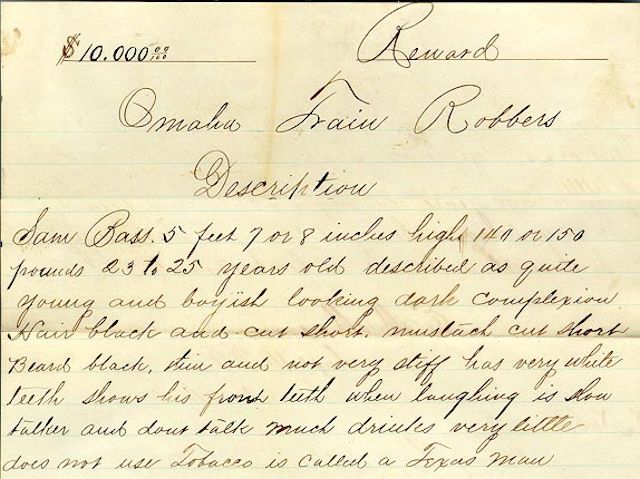
This “wanted” description of Sam Bass was circulated after the Big Springs train robbery. (Image from Texas State Library and Archives Commission.)
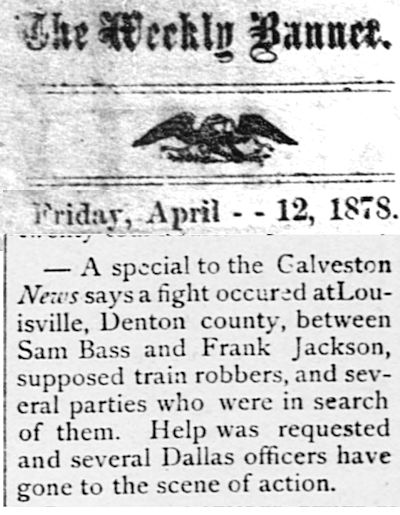 In April 1878 the Brenham Weekly Banner reported that “supposed train robbers” Sam Bass and Frank Jackson had engaged in a gunfight with pursuers at Lewisville.
In April 1878 the Brenham Weekly Banner reported that “supposed train robbers” Sam Bass and Frank Jackson had engaged in a gunfight with pursuers at Lewisville.
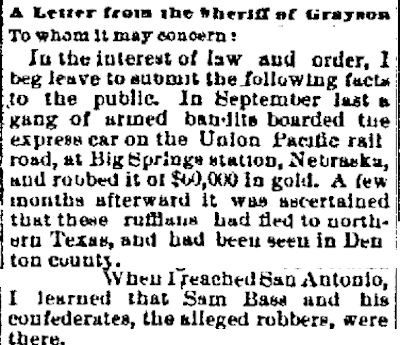 And in this clip from the April 20, 1878 Dallas Weekly Herald the sheriff of Grayson County (adjacent to Bass’s home county of Denton) issued an alert about Bass and company.
And in this clip from the April 20, 1878 Dallas Weekly Herald the sheriff of Grayson County (adjacent to Bass’s home county of Denton) issued an alert about Bass and company.
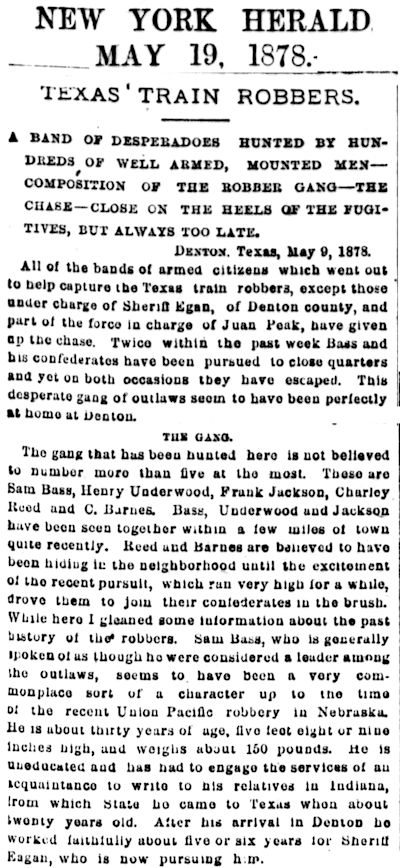 The “desperadoes” made headlines even in New York City.
The “desperadoes” made headlines even in New York City.
Back to Dave E. Burns. In his interview with the Federal Writers’ Project interviewer in 1937, Burns said that in an unnamed year in the 1870s (possibly 1876) he was driving a herd of two thousand cattle up the Chisholm Trail with rancher Joel Collins. By some accounts, Sam Bass took part in that cattle drive. At a “camp supply” on the trail, Burns remembered, Collins “met up with” Bass. Collins invited Burns to join their gang, but Burns declined.
Here, in Dave E. Burns’s own words, is his memory of Sam Bass and Round Rock:
We arrived at Camp Supply and there Joel met up with Sam Bass. The second day at Camp Supply, Joel called me and sez to me, “I have a good deal in the making and you are just the kind of a buckaroo I want to take in with me.” So we [sauntered?] over to where Sam Bass and several others were. The layout offered to me was for me to join up with the gang and go to making “big money” as they put it, doing anything from rustling cattle to bank robbery. They had an oath that they read to me and I was to swear to it before I would be accepted. The oath read that a person must accept the orders of the chief, never tell anyone about plans, never admit doing a job, or tell whom the other members were. Death was the penalty for breaking the oath. I refused to become a member, and Joel argued with me for two days trying to get the idea into my conk, but it was a hopeless job, which he finally agreed to and he sez to me “Lad, you’re missing the chance of a lifetime to make big jack and be able to take it easy.” But I could not see it that way and told him so. I sez to him, sez I, “Joel, I am looking for hard work.”
After he seen that I would not join the gang, I and four others were started back to the ranch with 400 hosses that he had traded for.
. . . I joined up with the Texas Rangers in September 1877 [about the time of the Big Springs train robbery] . . . Sam Bass and his gang were operating heavy at that time, and we were after him wanting to get the dead wood on him. Our first tip was that the outfit would be at San Angelo on a certain day to stick up the bank. On that day we were planted in San Angelo, but the bank at Eden was busted on that day. The next order came directing us to be at Brownwood. On that day the bank at Brownwood was calculated to be busted, the bank at Coleman was robbed. The next order was that we should plant ourselves at Waco, and on that day the bank at Terrell received the visit.
The tips were coming in from some member of the Bass gang, and most likely it was [Jim] Murphy. Sam Bass was wise to the fact that someone was tipping off his plans, and Sam was crossing the law, which was shown by him always pulling a job at some point different from that which we calculated but on the same day.
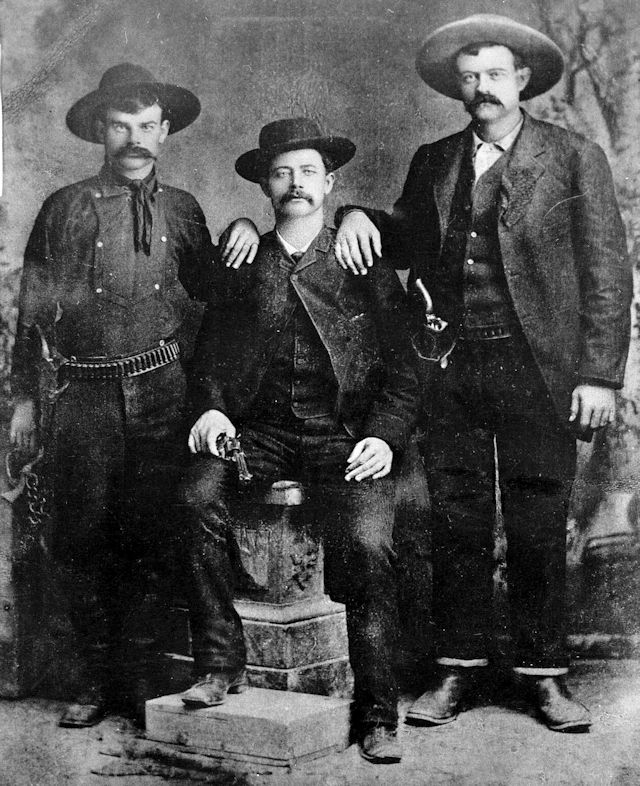
[Due to the nature of the business, during the short history of the Sam Bass gang, its membership was fluid. This photo—from Hardin-Simmons University Library—shows, from left, Jim Murphy, Sam Bass, and Seaborn Barnes.]
Dave E. Burns continued his story:
Finally we were ordered to be at Round Rock. The order was on a tip that the Bass gang would bust the bank there that day. I do not believe Round Rock was the town picked by the gang because only three of the gang made a show. The three were Sam Bass, Bill (Jim) Jackson, and Jim Burns. Burns was a cousin of mine, and his father was a preacher. Jim joined the gang at Terrell and had not been with the gang long.
My company of Rangers were at Austin when the order was received. We left Austin at 2 a.m. and arrived at Round Rock around 5 a.m. The captain [McNally] planted me at the northeast corner of the square, next to a saloon and on the street leading to Austin. My orders were to watch for any of the Bass gang and report their movements, and there was to be no shooting until ordered. McNally wanted to get them in a bunch and take them all.
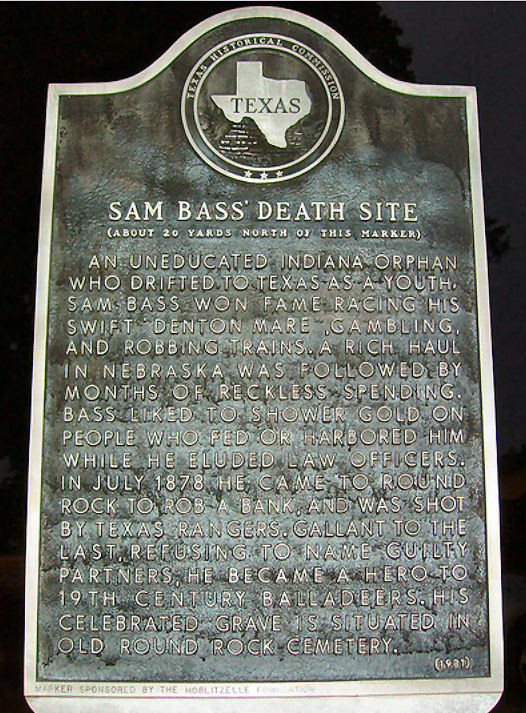
The sun was just rising when I spied three men on hosses riding into town. They reached the square and tied their hosses across from where I was planted. I recognized at once who the men were. Sam Bass, I met him the first time in Camp Supply. Jim Burns, of course, was my cousin. Bill Jackson was a stranger to me.
They came across the street towards the saloon, next to which I was standing. As they came up to me, Bass and Burns recognized me, and they stopped. Sam and Burns each says, “Hello, Dave,” and we went to chinning. I says to them:
“You boys know me and what I am doing now.”
“Sure do, Dave,” Sam says. “Come in and have a drink.”
“Can’t do it, fellows. It’s against the orders,” says I. “What are you fellows doing here?”
“Just jiggling through,” says Burns.
“Well, you had better duck,” I says to them. They turned to go into the saloon, and Sam, looking back over his shoulder, laughed at me and says, “Sorry, old top, your duties won’t allow you to take a drink with a friend.”
They went into the saloon, and they no more than had entered when a deputy sheriff came up to me and asked:
“Who were them men that talked to you packing all that artillery? Let’s go in and get them.”
“No,” says I. “My orders are to remain here and watch till I get further orders.”
“Well, I am going in,” says he.
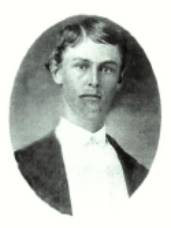
I do not recall the name of that deputy; it has plumb spilled my mind [the deputy was A. W. Grimes; see photo]. He entered the saloon, and in a jiffy I heard one shot fired and the thud of a body hitting the floor. I became anxious to see the captain and get action orders. It passed through my conk that hell was a-going to pop. I looked across the street, to the west, and there I saw McNally coming a-running like a streak carrying his hat in his hand. That deputy had jumped the game ahead of time, and all we rangers were scattered.
For a minute or two there was plenty of artillery action. The shooting suddenly ceased, and I saw Sam and his pals backing out of the saloon with their guns leveled, holding the crowd inside. They backed across the street towards their hosses. I could see that Sam was in bad shape, and when they reached their hosses Burns had to help Sam to mount. I could have pumped all of them full of lead, but I was still waiting for orders, not wanting to go against the rule.
When Sam mounted, the boys in the saloon came running out, through doors and windows. McNally came out first and yelled to take after them. There were twenty-one of us Rangers, and we pronto made our mounts and took after the three men. In addition there were others, some hankering to help, and some wanted to get an eyeful. There were folks in wagons pulled by mules and folks on hossback all going down the road on a dead run. We rangers were in the lead. When we had dragged out of town about a mile and a half, I saw Sam’s hoss grazing off near the road. I says to McNally, “There is Sam’s hoss over yonder. I’ll go over and have a look.” I went over there, and under a blackjack tree laid Sam, with his conk cover covering his face. I raised his lid, and he turned his head slightly and looked at me and says:
“It’s you, Dave.”
“Yes, Sam, it’s Dave,” says I.
“Well, they have done all they can. It won’t be long till ’tis said that I was killed,” he says.
“I can’t help what has been done,” says I, “but I’ll do all that I can for you. You should have ducked when you saw me. You knew what I was doing.”
We took him back to town and put him in a room over a drugstore, and he died early the next morning [July 21, Bass’s birthday]. I was present when the doctor said there were twenty-eight holes in him.
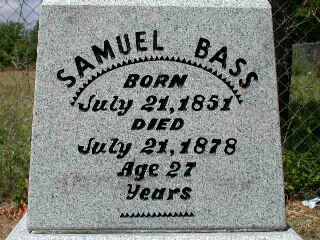
Before he [Bass] died he called McNally to him and says, “There is $500 in my pocket. Take the money and my hoss and give both to the deputy’s wife. I won’t have any further use for either.”
 Clip is from the July 27 San Marcos Free Press.
Clip is from the July 27 San Marcos Free Press.
That ends Dave E. Burns’s account of the death of Sam Bass. A caveat: Burns’s account of the events at Round Rock differs in several details—some minor, some major—from generally accepted accounts.
Posts About Fort Worth’s Wild West History
Posts About Crime Indexed by Decade
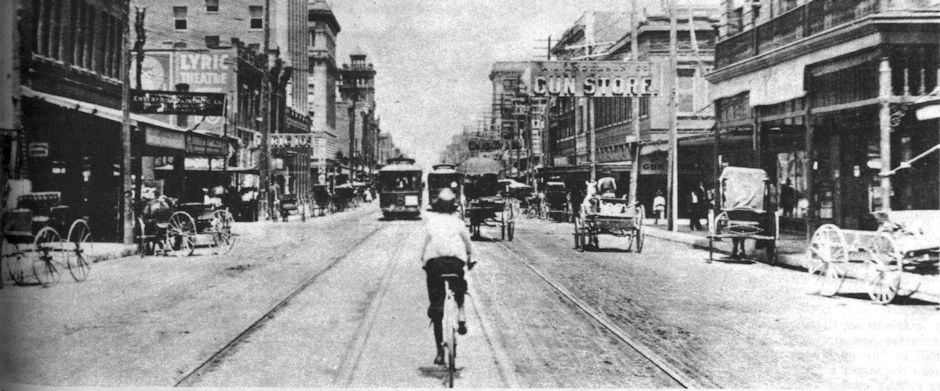





DAVID ELBERT IS MY GG GRANDFATHER – I CAN’T TELL YOU HOW AMAZING IT WAS TO READ HIS OWN WORDS! THANK YOU FOR THIS!!
Thanks. The Federal Writers Project did us all a great service.
I love reading all your articles about Fort Worth. Where do you find everything?
Thanks, Sue. This blog has pretty much been a full-time job for more than six years now, so I have amassed a collection of resources. Heck, sometimes I even go to . . . oh, you know, that big building with books . . . what’s it called? . . . oh, yeah, the library!